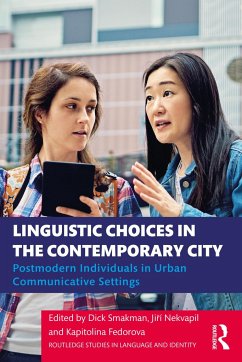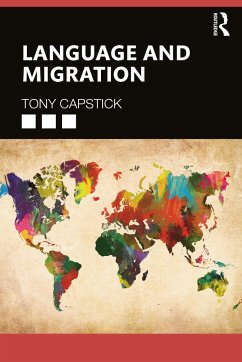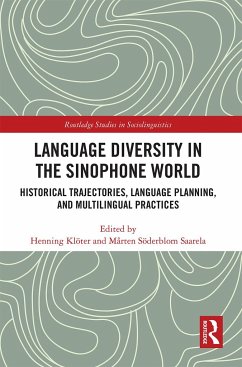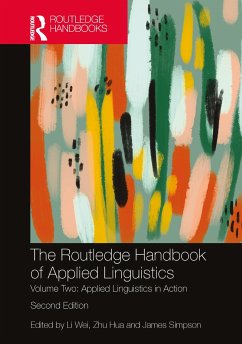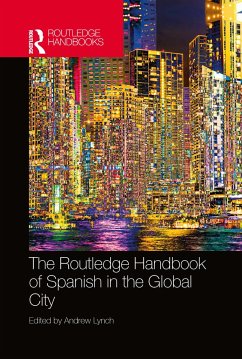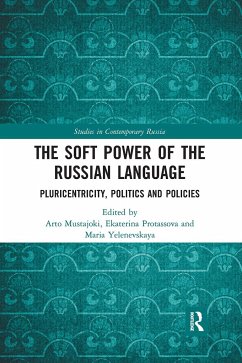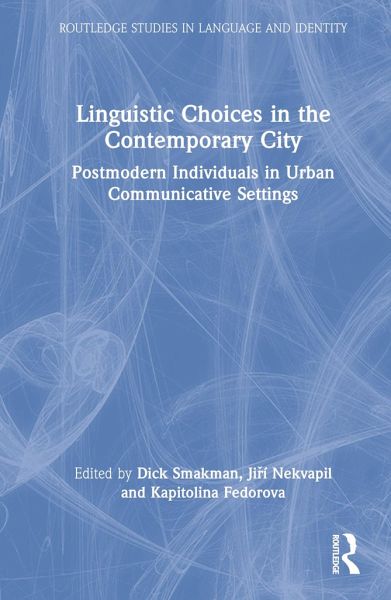
Linguistic Choices in the Contemporary City
Postmodern Individuals in Urban Communicative Settings
Herausgegeben: Smakman, Dick; Nekvapil, Jirí; Fedorova, Kapitolina
Versandkostenfrei!
Versandfertig in 6-10 Tagen
154,99 €
inkl. MwSt.
Weitere Ausgaben:

PAYBACK Punkte
77 °P sammeln!
Linguistic Choices in the Contemporary City focuses on how individuals navigate conversation in highly diversified contexts and provides a broad overview of state of the art research in urban sociolinguistics across the globe. Bearing in mind the impact of international travel and migration, the book accounts for the shifting contemporary studies to the workings of language choices in places where people with many different backgrounds meet and exchange ideas. It specifically addresses how people handle language use challenges in a broad range of settings to present themselves positively and m...
Linguistic Choices in the Contemporary City focuses on how individuals navigate conversation in highly diversified contexts and provides a broad overview of state of the art research in urban sociolinguistics across the globe. Bearing in mind the impact of international travel and migration, the book accounts for the shifting contemporary studies to the workings of language choices in places where people with many different backgrounds meet and exchange ideas. It specifically addresses how people handle language use challenges in a broad range of settings to present themselves positively and meet their information and identity goals.
While a speaker's experience runs like a thread through this volume, the linguistic, cultural and situational focus is as broad as possible. It runs from the language choices of Chinese immigrants to Beijing and Finnish immigrants to Japan to the use of the local lingua franca by motor taxi drivers in Ngaoundéré, Cameroon, and howHungarian students in their dorm rooms express views on political correctness uninhibitedly. As it turns out, language play, improvisation, humour, lies, as well as highly marked subconscious pronunciation choices, are natural parts of the discourses, and this volume provides numerous and extensive examples of these techniques. For each of the settings discussed, the perspective is taken of personalised linguistic and extra-linguistic styles in tackling communicative challenges. This way, a picture is drawn of how postmodern individuals in extremely different cultural and situational circumstances turn out to have strikingly similar human behaviours and intentions.
Linguistic Choices in the Contemporary City is of interest to all those who follow theoretical and methodological developments in this field. It will be of use for upper level students in the fields of Sociolinguistics, Pragmatics, Linguistic Anthropology and related fields in which urban communicative settings are the focus.
While a speaker's experience runs like a thread through this volume, the linguistic, cultural and situational focus is as broad as possible. It runs from the language choices of Chinese immigrants to Beijing and Finnish immigrants to Japan to the use of the local lingua franca by motor taxi drivers in Ngaoundéré, Cameroon, and howHungarian students in their dorm rooms express views on political correctness uninhibitedly. As it turns out, language play, improvisation, humour, lies, as well as highly marked subconscious pronunciation choices, are natural parts of the discourses, and this volume provides numerous and extensive examples of these techniques. For each of the settings discussed, the perspective is taken of personalised linguistic and extra-linguistic styles in tackling communicative challenges. This way, a picture is drawn of how postmodern individuals in extremely different cultural and situational circumstances turn out to have strikingly similar human behaviours and intentions.
Linguistic Choices in the Contemporary City is of interest to all those who follow theoretical and methodological developments in this field. It will be of use for upper level students in the fields of Sociolinguistics, Pragmatics, Linguistic Anthropology and related fields in which urban communicative settings are the focus.




